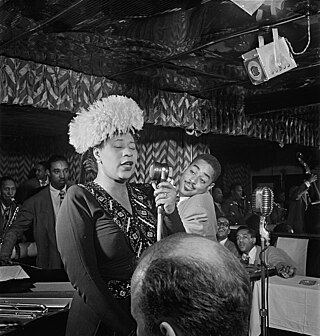
Originating in vocal jazz, scat singing or scatting is vocal improvisation with wordless vocables, nonsense syllables or without words at all. In scat singing, the singer improvises melodies and rhythms using the voice solely as an instrument rather than a speaking medium. This is different from vocalese, which uses recognizable lyrics that are sung to pre-existing instrumental solos.

Dinah Washington was an American singer and pianist, one of the most popular black female recording artists of the 1950s. Primarily a jazz vocalist, she performed and recorded in a wide variety of styles including blues, R&B, and traditional pop music, and gave herself the title of "Queen of the Blues". She was a 1986 inductee of the Alabama Jazz Hall of Fame, and was inducted into the Rock and Roll Hall of Fame in 1993.
Jump blues is an up-tempo style of blues, jazz, and boogie woogie usually played by small groups and featuring horn instruments. It was popular in the 1940s and was a precursor of rhythm and blues and rock and roll. Appreciation of jump blues was renewed in the 1990s as part of the swing revival.

William Ballard Doggett was an American pianist and organist. He began his career playing swing music before transitioning into rhythm and blues. Best known for his instrumental compositions "Honky Tonk" and "Hippy Dippy", Doggett was a pioneer of rock and roll. He worked with the Ink Spots, Johnny Otis, Wynonie Harris, Ella Fitzgerald, and Louis Jordan.
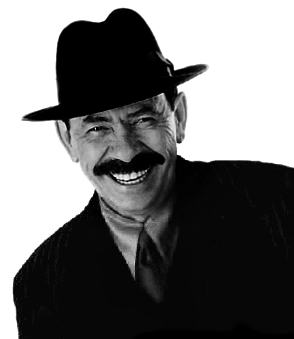
John Paul Larkin, known professionally as Scatman John, was an American musician. A prolific jazz pianist and vocalist for several decades, he rose to prominence during the 1990s through his fusion of scat singing and dance music. He recorded five albums, which were released between 1986 and 2001. As of 2023, Larkin has sold over 20 million albums worldwide and went 15 times gold and 18 times platinum.
The origins of rock and roll are complex. Rock and roll emerged as a defined musical style in the United States in the early to mid-1950s. It derived most directly from the rhythm and blues music of the 1940s, which itself developed from earlier blues, the beat-heavy jump blues, boogie woogie, up-tempo jazz, and swing music. It was also influenced by gospel, country and western, and traditional folk music. Rock and roll in turn provided the main basis for the music that, since the mid-1960s, has been generally known simply as rock music.
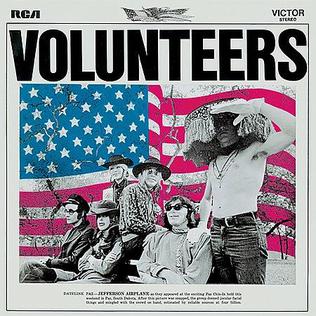
Volunteers is the fifth studio album by American psychedelic rock band Jefferson Airplane, released in 1969 on RCA Records. The album was controversial because of its revolutionary and anti-war lyrics, along with the use of profanity. The original album title was Volunteers of Amerika, but it was shortened after objections from Volunteers of America, a religious charity.

"Scatman (Ski-Ba-Bop-Ba-Dop-Bop)" is a song by American musician Scatman John. It was released in November 1994 as a single, and was later re-released in July 1995 for his second album, Scatman's World (1995). The song is described as "a blend of jazz scatting, rap, and house beats". It reached number-one on the charts in at least ten countries and also won the March 1996 Echo Award in Germany for the best Rock/Pop single. The music video for the song was directed by Kerstin Mueller and received heavy rotation on music channels.
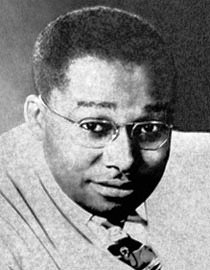
Joseph Christopher Liggins, Jr. was an American R&B, jazz and blues pianist and vocalist who led Joe Liggins and his Honeydrippers in the 1940s and 1950s. His band appeared often on the Billboard magazine charts. The band's biggest hit was "The Honeydripper", released in 1945. Joe Liggins was the older brother of R&B performer Jimmy Liggins.

Scat Paradise ("スキャット天国") is a Scatman John EP released only in Japan. It features the song "Hey, You!", a rarity previously only available as the B-side to the "Song of Scatland" single and later remixed and re-released as "U-Turn" on the Everybody Jam! album.
"Saturday Night Fish Fry" is a jump blues song written by Louis Jordan and Ellis Lawrence Walsh, best known through the version recorded by Louis Jordan and His Tympany Five. The recording is considered to be one of the "excellent and commercially successful" examples of the jump blues genre.

William M. "Wild Bill" Moore was an American R&B and jazz tenor saxophone player. Moore earned a modest hit on the Hot R&B charts with "We're Gonna Rock, We're Gonna Roll", which also was one of the earliest rock and roll records according to some sources.
Connie Curtis Crayton, known as Pee Wee Crayton, was an American R&B and blues guitarist and singer.

"Be-Bop-a-Lula" is a rockabilly song first recorded in 1956 by Gene Vincent and His Blue Caps.

Tina Dixon was an American R&B singer, actress and comedian. She became a featured singer in swing bandleader Jimmie Lunceford's band early in her career and recorded for Excelsior, Aladdin, and King Records in the 1940s. By the 1970s, Dixon was making x-rated party records as Auntie Tina Dixon.

"Roll 'Em Pete" is a blues song, originally recorded in December 1938 by Big Joe Turner and pianist Pete Johnson. The recording is regarded as one of the most important precursors of what later became known as rock and roll.
James A. Wynn Jr., known as Big Jim Wynn, was an American jump blues saxophonist, pianist and bandleader.
Clifford Donley Scott, born and raised in San Antonio, Texas, was an American saxophonist and flautist who played in jazz, blues, and R&B idioms.
Billboard Most-Played Race Records of 1946 is a year-end chart compiled by Billboard magazine ranking the year's top race records based on the number of times the record was played on the nation's juke boxes.Billboard assigned point totals to each record based on its juke box plays.
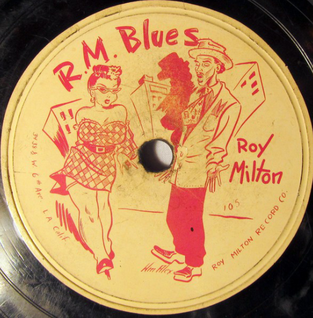
"R. M. Blues" is a blues song written by Roy Milton and performed by Roy Milton and His Solid Senders. It was released on the Juke Box label and Specialty labels, as well as Milton's own Roy Milton Record Co. Milton played drums and sang on the record.











